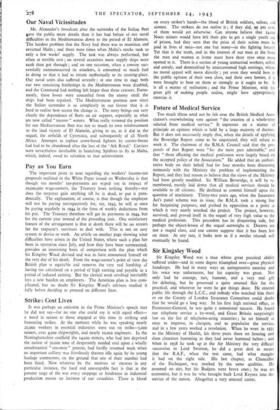Strikes Cost Lives
It was perhaps an omission in the Prime Minister's speech triat he did not say—for no one else could say it with equal effect— a word in season to those engaged at this time in striking and fomenting strikes. At the moment while he was speaking nearly 20,000 workers in essential industries were out on strike-5,000 miners, over 4,000 shipwrights, and nearly zo,000 engineers. In the Nottinghamshire coalfield the 14,000 miners, who had just deprived the nation of 50,000 tons of desperately needed coal upon a wholly unsubstantial " one-man " pretext, had hardly resumed work when an important colliery was frivolously thrown idle again by its young haulage contractors, on the ground that one of their number had been fined. Now whatever be the motives or excuses in any particular instance, the hard and unescapable fact is that at the present stage of the war every stoppage or hindrance in industrial production means an increase of our casualties. There is blood
on every striker's hands—the blood of British soldiers, sailors, and airmen. The strikers do not realise it ; if they did, 99 per cent. of them would act otherwise. Can anyone believe that 14,000 Notts miners would have left their pits to get a single youth out of prison, had they seen that the price of their action must be paid in lives of men—not one but many—in the fighting forces? Yet that is the truth, and in the interest of our men at the front the men and women at home must have their eyes once more opened to it. There is a section of young unmarried workers, selfish and unruly, and demoralised by unaccustomed high earnings, whom no moral appeal will move directly ; yet even they would bow to the public opinion of their own class, and their own homes, if it were brought to bear on them as strongly as it ought to be. It is all a matter of realisation ; and the Prime Minister, with his great gift of making people realise, might here appropriately exercise, it.


























 Previous page
Previous page